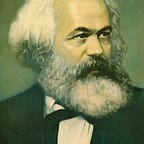On the Question of Unity
The Shawarma Bolshevik
Comrades, the question of unity continues to elude many of us within the ranks of the ever agitated proletariat. In the desperate pursuit of social change, we find that an increasing number of our brothers and sisters continue to compromise fundamental differences in humanity in the name of unity of the working peoples. But thus we are faced with the essential question: what is unity? Do we need unity, and if so, of what character?
First I shall briefly describe unity as a concept. There is no inherent concept such as unity (that is, there is no realistic scenario under which all people find themselves in universal agreement, with no significant deviations). This is merely a farce. Rather, unity as a logical concept can only mean the collective working of a group of individuals, under which disputes are principally dealt with in the open, but are all implicative of the presupposition of a common thread of thought.
In our case of proletarian unity it means, as V.I Lenin so aptly puts it:
Unity is a great thing and a great slogan. But what the workers’ cause needs is the unity of Marxists, not unity between Marxists, and the opponents and distorters of Marxism.
We must strive for principled unity, but to compromise our fundamental common thread of thought, Marxism, is to sacrifice the victory of the proletarian movement. Unfortunately, we face the self-proclaimed Marxists who have inevitably given in to vulgar mechanical idealism, which has shaped their image of unity and proletarian strength. That is, we become subject to the incomplete analyses of the further disenfranchised proletariat who, in its desperation for immediate change, devolves into petty economism, rejecting the whole character of political, class struggle.
Unity involves determined struggle. Without it, we have not unity, but a conglomerated mess of a slew of ideological struggles, competing within the same sphere of operation. We must not strive for unity for the sake of unity. Rather, we must strive for unity through struggle. In this way we are able to achieve the most powerful of unions of proletarian solidarity. We are often slandered for being divisive, in refusing to take unity from the hands of someone else, accepting it as though it were a gift dropped from the heavens. We are told that we serve the ruling classes, who seek to keep the masses divided. But what these critics fail to grasp is that in proposing petty unity, they invite the presence of reactionaries, on the basis of agreement of policy, devolving once again into economism. Organization around single economic struggles is nothing more than petty economism, as it unites the people around one issue, which in itself requires a mechanical analysis of individual policy, as it excludes the material reality that all social issues interact with one another. This means we might unite with fascists under the unifying tent of increased wages, where we choose to ignore the racial intolerances and reactionism of these individuals, until it poses greater threats further along. We need not an economic struggle that has been lent political characteristics, but a political struggle of the masses.
The cycle of “struggle-unity-struggle” requires of us the continuous challenging of our beliefs, so that we might strengthen our unity. Unity for the sake of unity is not unity at all. Unity comes as the synthesis of the resolve of ideological contradiction, to evade this step in achieving unity is to be anti-Marxist. We mustn’t compromise our beliefs in the name of unity. We know fully well that our beliefs are popular, and the assumption of the alternative is of extreme idealistic impression, as it implies the need to confront ideas rather than material reality. As such, we must rather fight tooth and nail to reconcile the antagonisms between theory and practice. The war for unity is not one of ideas, but of organization, of this aforementioned practice. The unique nature of the proletarian revolution makes this the greatest challenge. Where the bourgeois democratic revolution simply required force to seize the already developed capitalist organs that had been readily prepared within the feudal system, the proletariat here requires an alternate strategy, as these analogous socialist organs are barely existent within the capitalist order, if at all.
Thus, the proletarian task of unity is not one of ideological force, under which we falsely attribute agreement of a single or few ideas to that of unity. Rather, it is one of organized struggle to put into practice the developed revolutionary ideas. In this way we find our comrades, but more importantly our enemies. Unity for the sake of unity assumes we will not find these enemies because we choose not to. But this is wrong. To struggle is to achieve the most powerful of unities, but to await its arrival is to achieve self destruction.
And thus are the principles of unity.
